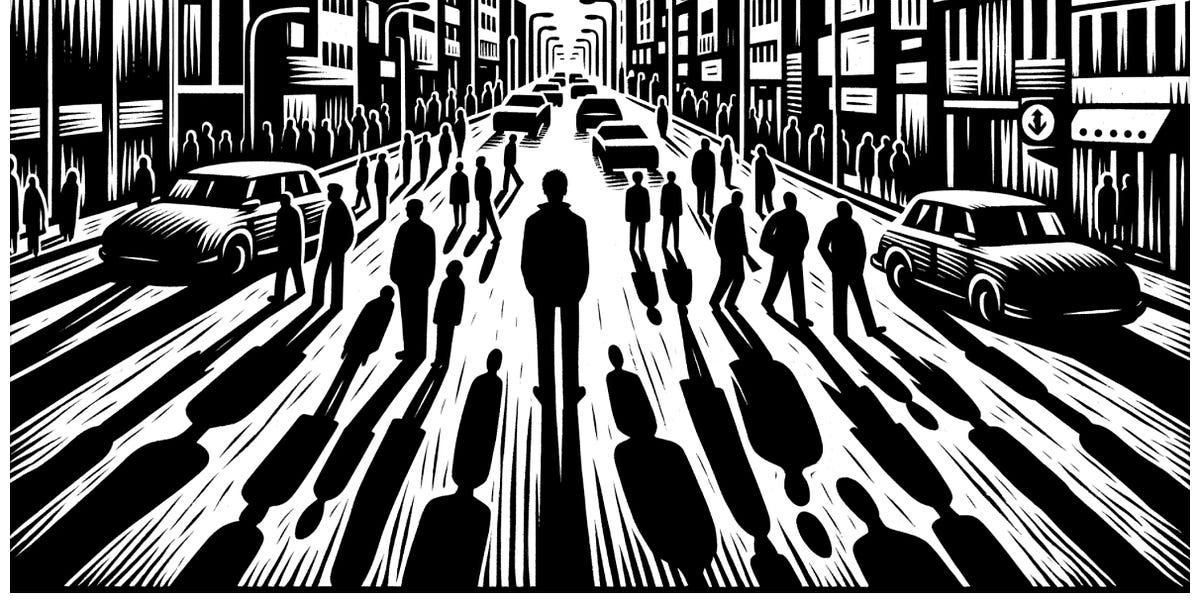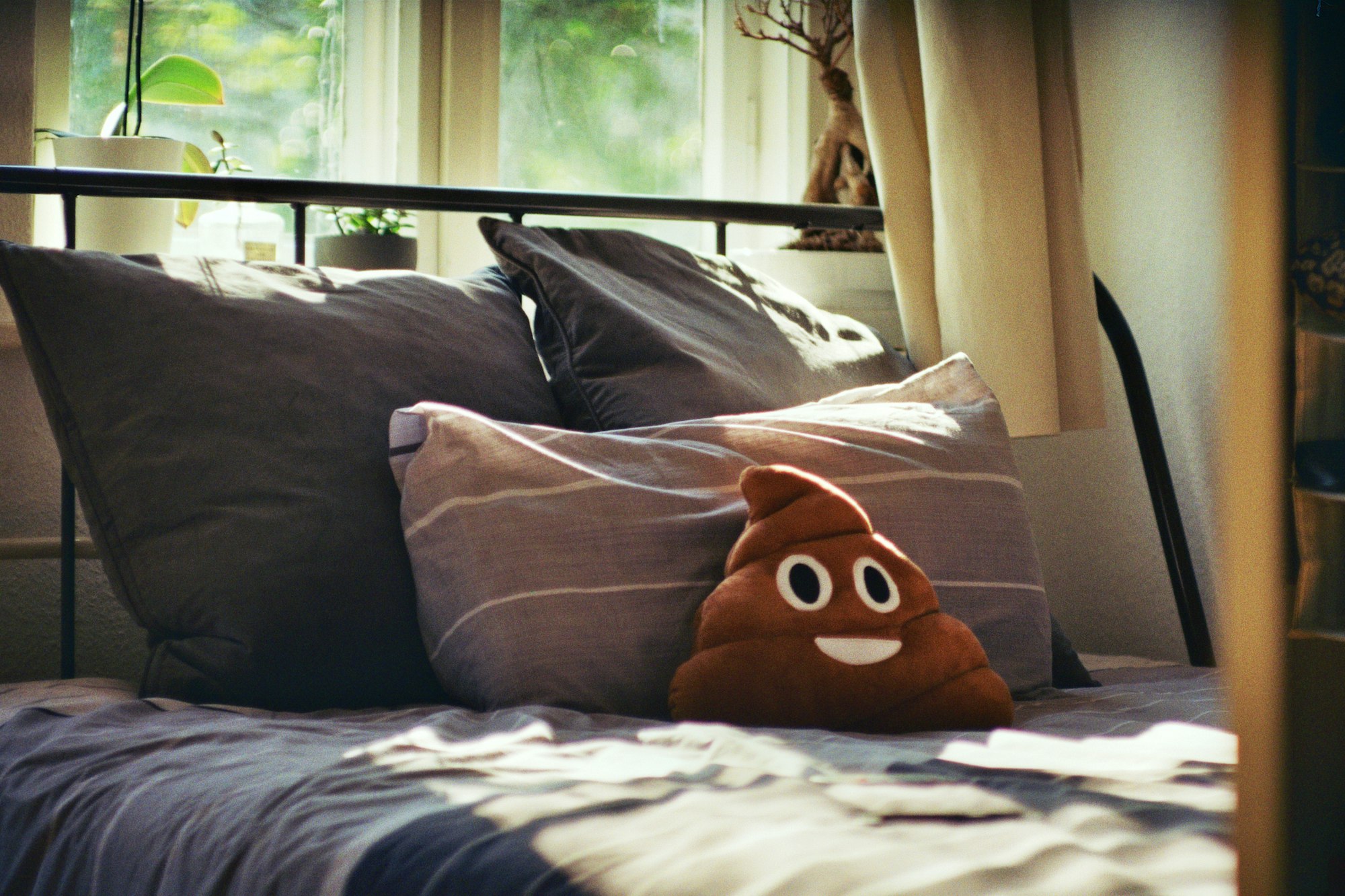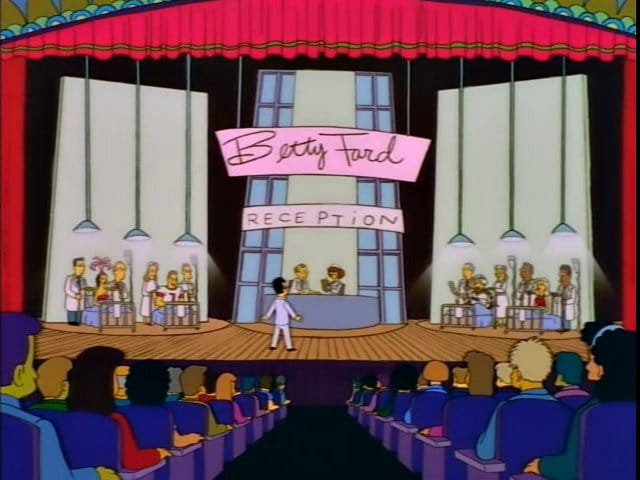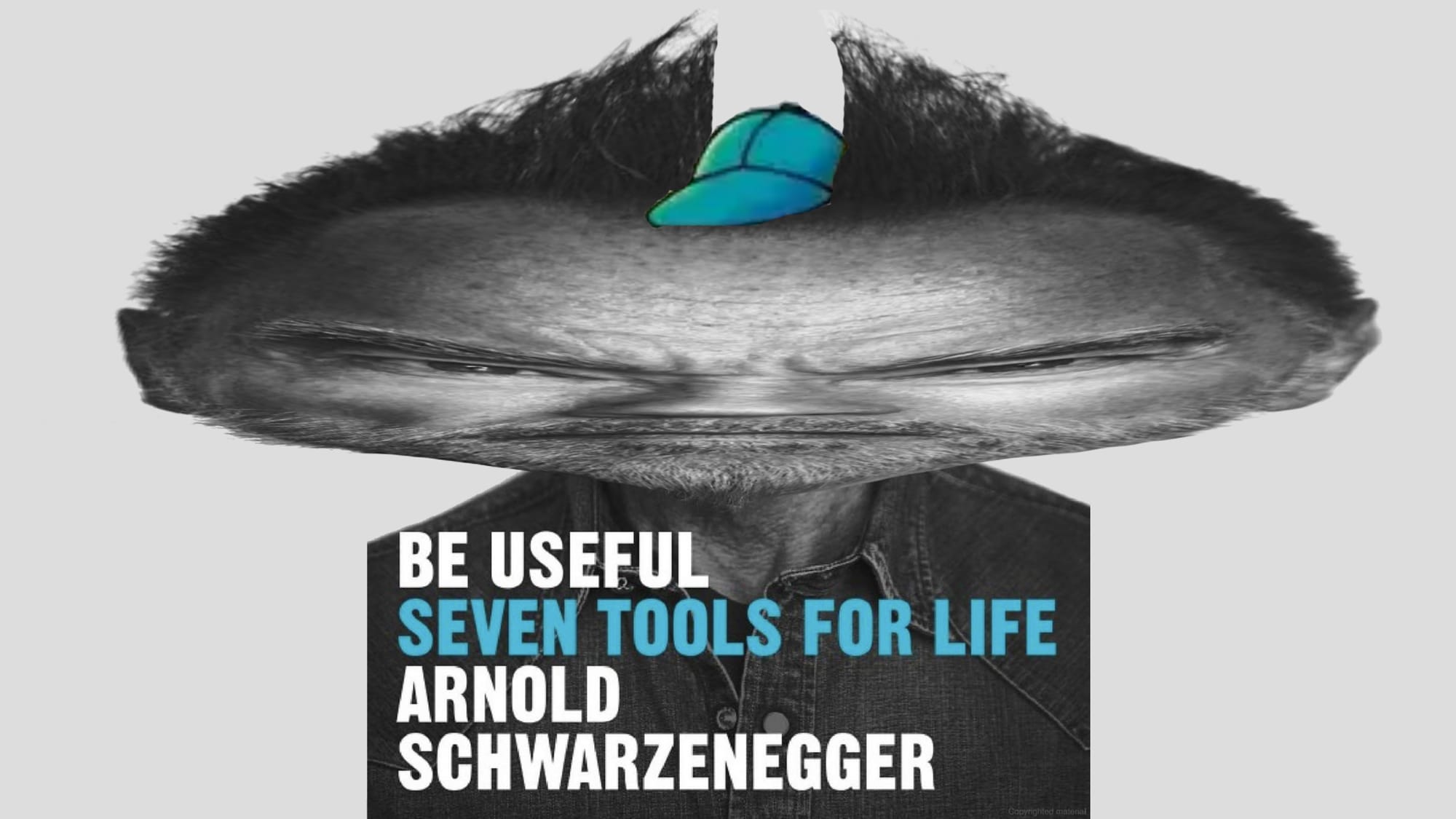Your cart is currently empty!
Category: The Cynic’s Guide to Self-Improvement

Making The Link
While I’m working on a bigger piece, I figured I’d write up some self-improvement links I thought were worth collecting. I haven’t done this before so I’m not sure if it’s a good idea. Do you like this sort of thing? Do you want to submit a link for a future newsletter? Let me know in the comments.
But you should probably read the newsletter first.
Blue zones might not be real
Heard of “blue zones?” You probably have: there are many articles, multiple books, TV docos, and a Netflix show. The idea is simple: that in areas where people mostly eat simple, reasonably nutritious food, walk around, and have a good sense of community, longevity follows. Good ol’ small-town country livin’, in other words. Now a (preprint) scientific paper throws the whole premise in doubt. It’s one of those excellent scientific reports that’s summed up neatly in the headline: “Supercentenarian and remarkable age records exhibit patterns indicative of clerical errors and pension fraud.” Yup: Blue Zones look to be either people forgetting how old they are, or “forgetting” how old they are.
Caution is warranted. It’s a preprint, for one thing, and for another it would be a mistake to throw out the “eating well, enjoying community, and taking active transport” baby with the “extraordinary claims of longevity require extraordinary proof” bathwater. But if Occam’s Razor holds, as it so often does, it looks like we’ll be able to replace the blue zone concept with a bunch of actual old frauds.

Love languages definitely aren’t real
As reported by New Zealand Geographic, my favourite magazine and one to which I wholly recommend subscribing, love languages are bunk. First described in 1992 by Baptist pastor Gary Chapman, the “five love languages” are familiar to self-help aficionados and anyone who’s ever fallen foul of a certain kind of social media algorithm: physical touch, words of affirmation, acts of service, quality time, and receiving gifts. So far, so good: that’s a list of things that nearly everyone likes. But it gets more complicated! Everybody supposedly has a primary and a secondary love language, and to love your partner efficiently, you must learn to speak their love language.

This book cover is peak 90s self-help design, and is one of the happy cases where you can get everything of value in the book from merely reading its cover. Not so, Impett et al argue, in an paper that manages to be delightfully tactful while destroying love languages with facts and logic:
Despite the popularity of Chapman’s book The 5 Love Languages, there is a paucity of empirical work on love languages, and collectively, it does not provide strong empirical support for the book’s three central assumptions that (a) each person has a preferred love language, (b) there are five love languages, and (c) couples are more satisfied when partners speak one another’s preferred language
This is bound to annoy people whose love language is being annoyed when their favourite bit of bunkum gets munted by science. “But my love language is gifts, and I know it, because I really like getting gifts.” OK! I don’t really think it matters that much if people are using “love languages” as a shorthand or excuse for doing nice things for each other, just as I’m not overly fussed by people who take astrology slightly seriously. There’s plenty of potential harm for people who go too hard on it – for instance, anyone who says they’d “never date a Virgo” is dismissing one twelfth of the human population for no good reason, and anyone who takes love languages too seriously is potentially depriving themselves of, well, love. But using it to get more pressies or hugs? Sure, why not. Go for your life. The authors seem to get it:
We offer an alternative metaphor that we believe more accurately reflects a large body of empirical research on relationships: Love is not akin to a language one needs to learn to speak but can be more appropriately understood as a balanced diet in which people need a full range of essential nutrients to cultivate lasting love.
Lovely. Go read the whole paper, it’s very accessible to laypeople and (to me and possibly no-one else) very funny in the its methodical, wholesale destruction of love languages.

This meme managed to bother me in every possible way, as on the one hand I feel like I could make more use of my talents if I could better market myself, or wanted to; but I simultaneously feel like I fall into the overconfident dude bracket. Thanks, Internet – as usual, you’ve been no help at all. Holy scientific method, Batman
New research just dropped about how science can inspire spiritual feelings and it’s about goddamn time.
This… suggests that spirituality of science reflects a unique attitude toward science that is not captured by belief or interest in science, but which is characterized by its unique associations with awe and spirituality.
Sure, it’s just a survey, but I like that someone out there is looking at this stuff, as I’ve been fascinated by the idea of scientific spirituality since I read Carl Sagan’s The Demon-Haunted World and Pale Blue Dot. This, in particular, resonated:
Science is not only compatible with spirituality; it is a profound source of spirituality. When we recognize our place in an immensity of light‐years and in the passage of ages, when we grasp the intricacy, beauty, and subtlety of life, then that soaring feeling, that sense of elation and humility combined, is surely spiritual… A religion old or new, that stressed the magnificence of the universe as revealed by modern science, might be able to draw forth reserves of reverence and awe hardly tapped by the conventional faiths. Sooner or later such a religion will emerge.
That does sound nice! But don’t think about it too hard, or you might find yourself beset (as I am) by a blizzard of cognitive dissonance where I imagine scientists presenting a paper in an attempt to inspire a congregation to feel the numinous as a janky band plays milquetoast rock and people sing whilst clapping out of time or waving their arms vaguely. To make it worse, I have rewritten my favourite Pentecostal worship song, Our God Is An Awesome God, which – I can’t stress enough – is real. (Please click that link, if only for the ~2 minute drum intro.)
Josh’s version:Auroras: a phenomenon
They cause oxygen
To emit red photons
Oh, forbidden transition!I’m sorry about all that. Let’s forget science for a bit, and draw from the reliable well of hokum and witchcraft:
How to use chickens to cure cat allergies
DID YOU KNOW: if you have cat allergies, a cure is simple! First, acquire some chickens. Encourage your cat to make friends of the chickens, or at the very least, make sure their boundaries overlap significantly. Care well for the chickens and give them a comfortable home, so they produce eggs. Then, feed some of the eggs to your cat. Bam, your cat allergy is gone!
Nonsense, right? Well, what if I told you that it’s all true?
It is. There’s a protein in cat saliva called “Fel d1” that’s responsible for most feline allergies. Because cats groom themselves with their tongues, the protein gets everywhere the cat goes, and that’s why your allergic brother starts sneezing the moment he enters your house. Chickens will produce antibodies to allergens they encounter in their environment, and these antibodies are passed into the yolks of their eggs, for the good of their young. So if you make sure your cat and chickens share an environment, and feed these yolks to your cat, the chicken antibody will nix the cat allergen. This incredible paper has the details. I’ve been meaning to get chickens, and I think this clinches it. (On the other hand, bird flu.)
Photo by Daniel Tuttle / Unsplash Birmingham
I’ve been a big fan of the Brisbane-based writer John Birmingham for a very long time, ever since I discovered his work via (this is telling on myself a lot) the long-defunct Australian “lad’s mag” Ralph. He’s probably best known as the author of He Died With A Felafel In His Hand, which has long resonated with me, as someone who had his share of horrific flatmates and revolting flats.
He’s still writing – he turns out enjoyably sweary, explosion-heavy sci-fi, and, like me, punishes himself by writing two newsletters despite being in the grip of the dead hand of procrastination. For Alien Side Boob, the best-named newsletter on Substack, he’s written two bangers. The first is on modern loneliness; he suggests that the title should have been “It’s The Phones, Stupid.”
As I grow older, I find that I have to put more effort into reaching out. Because, of course, I do. The things that make friendship and connection so easy when we’re young, time and proximity, work against us as the years pile on. With children and careers, time becomes short. The friends we held close in our teens and twenties might well scatter to the far side of the world in their thirties and beyond. It seems as if we’ll never have that easy confluence of time and presence until, of course… we do. Because the seasons of work and parenthood also pass.
Modern LonelinessI drove up the freeway to Ipswich early on Easter Sunday a couple of years ago. It must have been after the worst of COVID had receded, but it can’t have been too long after that weird, liminal disruption to all of our lives. The clock was running. I do remember that. I was making the hour or so round trip to pick up an old friend we were hosting for Easter lunch. I remember what we had. A slow-cooked shoulder of lamb with all of the trimmings, and chocolate, of course. Way too much chocolate. It was a very old-fashioned meal, top-shelf stodge, really. But this was an old-fashioned friendship, one that reached back over 50 years to the very first day of primary school.
It’s a timely read. I was in the grip of the usual low-grade Sadness that makes worthwhile work so hard and solipsistic scrolling so easy when I found the impetus to keep tapping away at this newsletter, and Birmingham’s most recent piece played a big part in that.
Focusing on goals, like winning a race or a game—or writing a book, or losing weight, or fixing the sliding door to the guest room that the stupid dog knocked off the runners during a thunderstorm a couple of years ago and which has been hanging there mocking you and your lack of home handyman skills ever since—focusing on those end goals is only likely to remind you that you haven’t fixed the fucking door and you don’t even know how to start and you are a worthless excuse for a man so why even bother.
Focussing on process, though? That’s the money shot.
For me, these days, that means two things. Writing stuff and staying well.
The process is “simple but hard,” which – in my growing experience of self-help stuff – bodes well.
I turn up at my desk every day at about the same time. I make a list of three things I have to work on, but I understand I may not get to the third, and that’s fine. I quickly check in with a writing buddy on the other side of the world, a guy who’s usually just sitting down to his evening writing session as I begin my day. We tell each other what we’re writing. Then, I meditate for ten minutes. When that is done, I turn on my timer, set it to fifty minutes, and start to write. When the timer goes off, I tick a box on my three-item to-do list. I set another timer. Ten minutes. I do some stretches. I might lift some weights or hit the punching bag. The timer goes off, and it’s back to the desk for another fifty.
I liked it so much that I’m copying it. A big chunk of this newsletter was written by the fairly simple expedient of setting a timer for 50 minutes and not doing anything else until it went “ding.” Of course, I’ve tried this sort of thing before, and it works, but I’ve often fallen off it because something fools me into thinking that I’ll find some other method that doesn’t require that first, gut-wrenching lurch into action. Accepting that sudden twist of fear has been the only thing that ever gets me doing anything worthwhile. It’s simple, but hard – and worth it.
The full newsletter is here and well worth reading. Content warning: it contains mentions of weight loss, but mostly in a “forgetting about weight and focusing on getting strong” way that I think is a net positive.
Trusting the processI wrote my first book, you know, that share house one, in five weeks, fuelled by four thousand dollars worth of hot chips, whisky and amphetamines. I had a goal. Get that sucker done before my 30th birthday. And one day before I fell backasswards out of my twenties I dropped the floppy disc with the finished manuscript on my publisher, Michael Duffy.
The products and services that support this newsletter
Hey! You know how I think that self-improvement content should be free, and so I make my newsletter aggressively free? Unfortunately I keep suffering from this nagging need to feed my family and pay the mortgage, and to that end I think I should probably try to make my tiny art-merchandise business something more than an annual tax liability. To that end, here is a tea-towel, designed by me, and printed right here in New Zealand. Do buy it.

A towel for teas, feat. Birds in Hats
Do you have teas that need towelling? Are you after a piece of display art that folds away neatly in a drawer? Or do you merely wish that more tiny hats came with accompanying birds? Manifest those desires simultaneously in your own home by simply buying these tea-towels I made that are currently sitting in a box and not towelling anything.
That’s it for today. I have high hopes that my new “do work instead of fucking around” method produces measurable results. I suppose we’ll find out together! To that end, here’s that large blue comment button again.
Because you have been patient, and you’re worth it, here is Pango the kitten.


Going To Pot
It’s not about marijuana, sorry. I’ll save that for another time.
It’s about the garden.
See, we have these potted plants on the deck. There’s herbs, some plants some friends gave us, a plant with a horrifically problematic name now known as a Thai lime, a non-Thai lime, a yellow flower whose name perpetually escapes me, and some pots of dirt.
(The dirt contains bulbs, which may or may not flower at some point in the future.)
Gerberas! That’s the name of the flower. When we got them, they looked lovely. We took good care of them, and the rest of the plants, and they rewarded us with many healthy flowers. For about two weeks. Then we started to forget to water them. Abruptly noticing the yellowing, drooping leaves and dying flowers, I’d drench the plant. This made things worse. Meanwhile, the plants kindly gifted by our friends live on the deck in the same temporary pots they arrived in. I’ve been meaning to put them in the garden for six months. Unfortunately, that hasn’t been possible because for the last 18 months or so the garden has been an impenetrable jungle. I’m barely exaggerating: I recently bought a machete to help deal with it.
In my defence, the yard is both large and challenging. When we bought the house it had a well-kept vegetable garden, several fruit trees, and an expanse of hedges that wouldn’t look out of place in the gardens of Versailles. The former owners liked hedges so much that some of the large camellia hedges have smaller hedges, under which are lesser hedges made of a kind of hedge-grass. Under these, I suspect, will be moss hedges, and so on.
Within a few months of moving in, the lawns approximated meadows, the vegetable garden was overrun, the fruit trees – perhaps aware of their fate – appeared to be trying desperately to leave the premises, and the hedges were performing the topiary equivalent of free-form jazz. The seedlings and bulbs and Little Gardens we planted got eaten by the weeds and an alarmingly large army of slugs and snails that, it turned out, lived in the hedges. I went out once after dark to pick some mint and found them crawling over the walls and plants. There were, once more without exaggerating, thousands of them. When my family visited from Australia and tried to make progress through a former gate, inhibited by a hedge comprised entirely of Triffids, I made embarrassed apologies for the state of the place. “Oh, no, it’s nice!” said my sister-in-law. “It’s like The Secret Garden.”
As the yard grew wilder, so did any hope of improving it. The base state was so unkempt that I felt like I couldn’t tackle any one aspect of it, and so it fell further and further behind where I wanted it to be.
Despite this, I’ve finally made some progress in the yard. It started by spending a few minutes of my breaks poking at the worst weed infestations, and escalated to swapping some of my Scrolling Time to spending early mornings outside, swatting at plants and digging things. In the same spirit of pointing out obvious things that motivates this newsletter and all of the self-help genre: it’s nice to get outside during the day, even if it’s raining.
Things reached a new level when I realised I owned the house and could kill any hedge I wanted. I’ve been at it for a month or two now, even hiring a mulching machine that allowed me to feed the hedges to the rest of the garden. The ones that didn’t mulch I set on fire. When my dad came to stay a couple of weeks ago we blitzed the whole place with loppers, chainsaws and trimmers, letting the surviving hedges off with a warning.
Sure, the garden had gone to pot, and it was a lot to deal with, but – once I found the right approach – all that was fixable. Now that the garden fundamentals are in place and I’ve finally caught up with all the overgrowth, it feels like we might have space for some of the other things we’ve been wanting to plant.
There was a point to this story, but it has temporarily escaped the chronicler’s mind.
It’s been a while since I last emailed and I am increasingly conscious of the gap. When I did a reader poll some time ago, people told me to take my time with newsletters, and I do, but consistency remains the elusive goal. It’s tricky to judge how much of my personal life to bring into what is mostly a personal development + comedy newsletter but it’s inevitably a lot. The fact is, our little family had more bereavement – my wife Louise’s much-loved nana Ella passed away, and a week later so did our much-adored tabby cat, Darcy. We like to think he went to keep her company.
In events’ wake, we decided not to have any pets for a while.
Last Monday, we were dropping Leo off at preschool when I spotted a tiny black shadow on the tight shoulder of the road. I pulled over and went back to check what it was, almost getting smoked by a car in the process.
I found this.

Of course, we’d decided not to have any more pets. Our resolve to stay the course lasted about two days. He’s since had a vet check-up (all’s well) and his name is Pango. As I write, my lap looks like this:

The cat distribution mechanism, something I was previously unaware of, has done its work. The cosmic ballet goes on. Oh! And speaking of the cosmic ballet:






A few snaps I took of the aurora. In the first photo two meteors are visible in the bottom-right of the sky, by the treeline.
When I heard about a solar storm predicted to cause aurora visible throughout the whole of New Zealand I steeled myself for disappointment. Surely it’d fizzle out, like the other times I’d chased aurora. But no. Somehow, we got Aurora Australis, at this time of year, at this time of day, in this part of the country. My brother-in-law and I drove out to his parents’ farm with my ancient, entry-level DSLR, and I took pictures I’ve been obsessing over ever since. Despite attempts, it’s impossible to do the aurora justice. While the colours are less intense than they appear in photos, no picture (or prose) can convey their sheer scale and majesty. The Lights are like a fracture in the sky, and it is easy to see why people have long attributed them to gods.
If you’re looking for a self-improvement moral, I suppose it’s that nature is healing – whether it comes in the form of gardens, or cats, or vast swathes of radioactive debris flung across space by a pitiless star. From my own experience, I can think of nothing better to lift your spirits than witnessing a once-in-a-century cosmic event. Do try it.

The Bitter-Pill Truth About Making Your Bed
Steel yourselves. I don’t know how one steels themselves – perhaps it is by taking an enormous amount of iron, grabbing a few charcoal bricks, and climbing into a blast furnace – but do what you need to prepare. This one is a big deal.
Throughout this newsletter, I have championed brevity, mainly in the works of others. This is ironic, because my own posts are often thousands of words long. And yet, I long still for the succinct. I crave it. I want a life-changing piece of advice to be one sentence. A life sentence, if you will.
Shower thought: a life sentence could be as short as one day. Hmm. Isn’t that profound? Such profundity, in your inbox, for free. I’d subscribe to me.
But I, as always, digress.
Here’s the point: I followed one of those pieces of self-help advice that everyone advises and no-one (except me) follows.
I made my bed, every single day, for one whole year.
Really.
And here are the staggering, jaw-dropping, doctors-hate-him results.
I hope you’re ready for this.
Every single day that I made my bed, my bed was made.
Let that sink in. I, single-handedly, or double-handedly if I’m being honest, overcame the forces of Chaos and Entropy and forced my own Order on an uncaring universe. I am the carpenter God of my own tiny world. I am the Maker of Beds.
I bet you want to know how I did it.
Method
Here is the Drummond Protocol for Bed-Making, as articulated on my four-hour daily science podcast, the B-Lab (podcast forthcoming, title TBC, sponsored by Mathletic Greens, the only supplement proven* to support your mathematical skill).
Step 1: Be alive.
Step 2: (Optional) Sleep in bed. You don’t actually need to sleep in a bed yourself. You can make someone else’s bed if you like. I suggest visiting a friend, or breaking in to a neighbour’s house. Surprise!
Step 3: Make the bed.
If you want to know more specifically how to make a bed, visualisation might be helpful. Perhaps you could do it as part of your daily meditation. Simply picture a bed, a made bed, as you might have seen in movies or catalogues advertising desirable goods and services. Then stop meditating and make the bed.
You can also manifest a made bed. Start by feeling that the Universe loves you and wants the best for you. (It doesn’t.) Imagine your made bed. Envisage it in rich detail. The satisfyingly smooth covers, the perfectly fluffed pillows. A duvet shook free of dust mites and cat hair. Let the image play in your mind, and then feel the universe make it real. Ideally, as a time-saving measure, you can do all this manifesting at the exact same time you actually make your bed. Isn’t the Universe amazing?
Results of daily bed-making (amazing)
What else happened? What superpowers resulted? What other beneficial habits did I take up as a direct result of my sheet-tugging and duvet-smoothening? How did my finances improve? Did my deadlift go up? What about the positive effects on my marriage and general well-being?
Steel yourself. No, wait, you already did that. Tungsten yourself. Prepare for jaw-dropping. I suggest either a cushion on the floor or a tiny crash helmet you wear on your chin.
What happened was:
Nothing.
In short: I made my bed every day and nothing happened.
That’s the article, but you can keep reading if you want.
I hope you enjoyed that. I did. Blowing the sentence “I made my bed for a year and nothing happened” out to 500-ish bloviated words is an enjoyable creative writing exercise; a must-do for any budding self-help author. I suppose it’s unfair to say that nothing happened. I liked having a made bed every day, or rather, every night, when I climbed into it. It’s nice for things to be tidy. And there was the usual mild satisfaction of doing something I hadn’t previously done on any kind of regular basis. But there was no epiphany, no greater purpose, no flow-on effect that I could notice. (Unlike taking cold showers, of which I’m still a daily fan.) And, believe me, with the bed-making I was trying to notice an effect. I didn’t want to be doing something every day for a year for no reason. It was very motivated reasoning! To make sure it was a fairish test, albeit a test with a sample size of one, I made a point of not making the bed for several weeks after my year was up and didn’t notice the slightest difference. I wish I could say that this was the Atomic Habit that I built an entire network of other beneficial habits on but it just… wasn’t. It was fine, I suppose, but it also didn’t matter.
It might be different for you. Maybe making your bed will set you up for life. Maybe it’ll drag you out of a funk. Maybe it will depress you. Maybe you’ll find a long-lost five dollar note in the sheets. I have no idea. You may as well try it; I definitely don’t think it’ll hurt. As far as risk calculus goes I think making your bed is up there with “going outside” and “drinking water;” it’s not advice that needs to be studded with caveats.
But there is another story here: a case-study in how the news media launders and makes up the kind of bullshit that’s designed to sell self-help books.
And, as it turns out, beds.
Make (Up) Your Bed (Bullshit)
There is no shortage of self-help stuff that tells you to make your bed. Many people’s minds probably turn to Jordan Peterson, whose book 12 Rules for Life I am, out of a sense of obligation to readers, reading. Aside: this book is hilarious. Here is a real excerpt.
Chaos, by contrast, is where – or when – something unexpected happens. Chaos emerges, in trival form, when you tell a joke at a party with people you think you know and a silent and embarrassing chill falls over the gathering.
I swear I didn’t make that up. The whole book is written that way and it’s one of the funniest things I’ve ever read. Wodehouse and Bryson have nothing on Peterson. Humour aside, Peterson is associated with bed-making, thanks to the chapter in 12 Rules for Life entitled “Set your house in perfect order before you criticise the world.”
We’ll make space for Peterson and this… interesting sentiment in another newsletter, but for now it’ll suffice that he’s sort of associated with making beds, or at least getting your room tidied up. Here’s a video of him expounding on bed-making, set to an inspiring free-music soundtrack, that I promise will not enlighten you at all:
If you want to save yourself five minutes, the auto-generated transcript gives you all the flavour you’re going to need, as his entire talk on bed-making is essentially one enormous run-on sentence.
…and so you want to clean up your room well okay how do you do that exactly well a room is a room is a place to sleep and so if you set your room up properly then you figure out how to sleep and when you should sleep and how you should sleep and then you figure out when you should wake up and then you figure out, well, what clothes you should wear because they have to be arranged properly in your dresser and then you have to have some place to put your clothes if you’re going to have some clothes…
So let’s leave Peterson for a bit. He doesn’t really dwell on bed-making all that much; for him it is just part of the setting-your-house-in-perfect-order continuum. The main Make Your Bed guy is one Admiral William H. McRaven.

Admiral McRaven is a real person, and is somehow not someone made up by Tom Clancy McRaven’s book on bed-making is called, as you might expect, “Make Your Bed.” It spawned a daily journal, also entitled “Make Your Bed,” and God knows how many knockoffs on Amazon and Kindle Unlimited, which are also mostly called “Make Your Bed.” I accidentally downloaded one called Make Your Bed: The Keys to Achieving Anything You Dream by John Dmitry Bordelon: do not make the same mistake. The McRaven original is exactly the the kind of self-help I always look for: distillable down from tens of thousands of words to a single sentence, which – blessedly – negates the need to buy the book. At least it’s shorter than most self-help, which is because it’s based on an even shorter commencement speech McRaven gave at the University of Texas that went viral. The rave music video based on the inspirational speech is shorter still.
Lots of people did buy the book, though. Make Your Bed is, astonishingly, a number 1 New York Times bestseller. I’ll never not be amazed that the most simplistic, obvious self-help stuff is what sells best.
I bought it too, of course, because it’s kind of my job.
And it’s fine, I guess? McRaven seems to be one of the less objectionable officers in the spectrum of those who serve the American Imperium, and his book does exactly what it says on the tin. Sure, it’s problematic in the way much self-help is – it glorifies martial ways of living, as taught by men who make a virtue of acquiring PTSD by blowing up anyone who hampers US access to oil fields – but ultimately it’s really just a lengthy, mostly harmless paraphrase of a Bible verse, Luke 16:10: “If you are faithful in little things, you will be faithful in large ones. But if you are dishonest in little things, you won’t be honest with greater responsibilities.” There is nothing particularly wrong with it, apart from the writing. Look, it’s self-help; if you’re after prose styling you’ll read Proust or something. But there is no excuse for this, apart from comedy:
For the first few months, we slept on Army cots. Nevertheless, I would wake every morning, roll up my sleeping bag, place the pillow at the head of the cot, and get ready for the day. In December 2003, U.S. forces captured Saddam Hussein. He was held in confinement during which time we kept him in a small room. He also slept on an army cot, but with the luxury of sheets and a blanket. Once a day I would visit Saddam to ensure my soldiers were properly caring for him. I noticed, with some sense of amusement, that Saddam did not make his bed. The covers were always crumpled at the foot of his cot and he rarely seemed inclined to straighten them.
There you have it. Be like McRaven, who always made his bed. Don’t be like Saddam Hussein, who was a military dictator, invaded Kuwait, gassed Kurds, and didn’t make his bed. Perhaps there’s a greater moral that if you are ever in military prison, you should always make your bed to impress your supervising guard, before you are hanged.
What the book doesn’t do is connect bed-making with any kind of evidence that it helps people. The benefits are, evidently, self-evident. This sent me on a search for something a bit more empirical.
Much like bed-making itself, I didn’t find anything particularly helpful.
There was plenty in the media about the benefits of bed-making. “People who spend a couple extra minutes smoothing the comforter back and rearranging pillows actually led more productive lives,” trumpets CNBC, under the clickbait headline “Completing this task first thing in the morning takes seconds—and it can make you more productive all day.”
Fascinating! What’s the source of this life-changing empirical data?
“…according to a new survey from Best Mattress Brand.”
Ah.
Now, let’s not be too cynical. Best Mattress Brand may not have the impact factor of the more prestigious sociology journals, but that doesn’t mean their methodology was unsound. Let’s have a look at their disclaimer.
These data are intended to be used for entertainment only. These data rely on self-reporting, and no statistical testing has been performed on the findings.
Okay, credit to you, Best Mattress Brand, for at least disclosing your methodology, but unfortunately it amounts to “our research is useless.” Or perhaps that’s unfair. I’m sure it’s useful for farming search-engine hits and milking affiliate links, which appear to be the reason Best Mattress Brand exists. What’s not useful is the way it’s muddied the bed-making discourse, with dozens of news sites citing Best Mattress Brand’s spurious research and results.
What else is out there?
Patient, a UK-based health advice site that sets itself apart with the claim that “all content is checked by health professionals,” cites a mixed bag of research. A tidy environment can improve or retain brain function – in the elderly. They also reference a study claiming that having a “tidy living space can increase your generosity.” Both these studies bode well for the elderly miser demographic, but the rest of us might be left wanting. Then they assert that “bed-makers have more sex.” Spicy! This seems like a tangible benefit. Let’s see what it links to.

Oh God damn it. Thanks, Patient. Your source for “bed-makers have more sex” is a site called “Mattress Nerd.” It is, of course, another SEO and affiliate link farm, that occasionally does real-ish surveys as an excuse to sell stuff.

“Best Mattresses for Sex.” I mean who hasn’t Googled that. The more I dug, the more garbage I found. An article at the Zanesville Times Recorder – a top Google result – linked to a 2012 article from Psychology Today, which you might think was credible. It’s not. “Make Your Bed, Change Your Life?” wonders the headline, before parading statistics from survey conducted by a website rejoicing in the name Hunch.com, which (inevitably) no longer exists. But wait, there’s always more. “Why Making Your Bed Every Day Isn’t Just Being OCD” says an organisation called Amerisleep, offending OCD sufferers everywhere. Its source, as far as I can tell, is a paper entitled “Save $450 On Any Mattress Plus Free Shipping.”
I could have kept going forever. I’m not going to. The media endorsement of the benefits of bed-making rests almost entirely on anecdotal evidence from admirable admirals and “for entertainment purposes only”-tier reports from link farms. I’m sure I could pick through Google Scholar for actual papers that link the benefits of bed-making to self-reported energy levels or something, but I suspect that (if they exist) they amount to the same thing: your mileage may vary. If it works for you, great. If it doesn’t, it probably doesn’t matter.
What to make of it all? Feel free to give bed-making a go, if you don’t do it already. Or, if you already make your bed regularly, you could try stopping! Chances are that neither will hurt, and who knows, it might be the world-changing, Saddam Hussein-beating life hack you’ve always wanted. But nothing I could find backed up the claim that making one’s bed is a necessary first step in becoming a virtuoso of virtue. Claiming a causal connection between bed-making and success seems a long bow drawn much too far. Start making your bed and you’ll still be you, muddling on in a confusing, complicated world – except at the end of the day, your bed will be made.
*Lies.

He’s checking in
Time for a low-pressure check-in newsletter. How are you doing? Good? Don’t worry, I’ll have found a way to make you feel bad by the end of this.
Yeet Your Phone: The Yeetening
In phone-yeeting news, I am done with Instagram, and probably social media in general for the foreseeable. It was prompted by the experience of writing my review for Arnold Schwarzenegger’s Be Useful. I generally grab the Kindle editions of self-help books because highlighting and switching to the audiobook version is easy, and it means the damn things don’t clog up my bookcase. I’d twice picked up my phone to open the Kindle app because I had to search for quotes and chapter headings, and each time – without meaning to – I ended up on Instagram. The second time it happened, it was as I picked up the phone while saying out loud “OK, gotta focus,” and as I did so my thumb, entirely of its own volition, flicked over to the Instagram app and opened it.
I deleted it a minute later. I’m sorry, friends who occasionally send or receive memes from me, but this is the sort of behaviour that in previous centuries would have resulted in an exorcism. A friend sent me a similar yarn:
That was the moment I quit Facebook. I walked up to a traffic light and then I was on Facebook and I went “WTF was that.” Then I put it in my pocket. Said “I won’t do that again.” Crossed the street, walked about 4 m and I was on Facebook.
Then I took a “2 week break” and never logged in again.
If I can figure out a social media strategy that has a purpose – actually engaging people in things I make or care about, like this newsletter – I’ll look to get back on it. Until then, fuck it. I’m out. The more I think about it, the more most social media feels like a scam. Even on the Twitter alternative I’m occasionally active on, Bluesky, I find I don’t get any engagement unless I’m kvetching about some kind of shared bête noire, like the catastrophic state of New Zealand politics. On that note, remember how I begged Kiwi politicians to f̶r̶e̶e̶ ̶t̶h̶e̶ ̶w̶e̶e̶d̶ permit the pseudoephedrine? It’s finally happening, in a striking case of the below:
Heartbreaking: The Worst Person You Know Just Made A Great PointBecause All Content Deserves To Go Viral.
The problem with much of social media is that anything that isn’t sufficiently strident doesn’t get picked up, and sometimes – like today – I just want to talk like I would amongst friends. I’ll readily admit that social media has its uses, like in activism, but selfishly I care about how useful social media is for me, my time, and my mental health, and on those measures it’s about as helpful as a daily lobotomy.

This was a mistake, and so was Facebook Caveat. Yes, I think it’s important that people know and care about important things that go on locally or in the world, like the genocide in Palestine, but I also think there are good ways to protest such things that aren’t necessarily social-media based. Here is a really good example. Indeed, we might need to work out ways of spreading awareness for important things that deliberately circumvent social media: Meta – not content with merely twisting the many knives it carefully placed in the rapidly expiring body of news media – is actively shadow-banning users and hiding posts that talk about Palestine. It’s another vote in favour of email newsletters. They’re a slower, more deliberate form of content, my stuff goes out to people who actively asked for it, and there are fewer algorithmic filters in the way.
I was planning to cold-turkey social media for a month for an upcoming edition of this newsletter anyway, but I’m doing it earlier than I’d planned to. Initial results in this experiment are good: instead of the traditional 3.5 hours of scrolling on Saturday, I cleaned most of the house. This has been a long-winded way of saying that, before I switched it off, Louise sent me a self-improvement-tangential funny she found on Instagram (screenshotted from Tumblr) and I thought you’d like it.

I had to know if that snippet was real, so I took out and immediately cancelled a “free” trial subscription to the newspapers.com archive to find out. I’m very happy to report that it is indeed real – and that Robert Benchley, grandfather to the guy who wrote Jaws, was writing some kind of analogue to The Cynic’s Guide To Self-Improvement as far back as 1935.

Benchley, it turns out, was very famous in his time. He was a writer and actor, with a fascinating, star-studded career. Here’s a telling extract from his lengthy Wikipedia page:
MGM invited Benchley to write and perform in a short production inspired by a Mellon Institute study on sleep commissioned by the Simmons Mattress Company. The resulting movie, How to Sleep, was filmed in two days, and it featured Benchley as both the narrator and sleeper—the latter a role Benchley claimed was “not much of a strain, as [he] was in bed most of the time.” … The only group not pleased was the Mellon Institute, which did not approve of the studio mocking their study.
That short film went on to win an Oscar. I’d like to hold out hope that my career trajectory might turn out similarly, but something tells me that not living in a small town in the middle of rural New Zealand might be a prerequisite for that kind of success. Which is probably for the best.
Up Lifting Tunes
Hey alright, it’s Kip Casper for Klon radio – L.A.’s infinite repeat! How we feeling out there? How’s your drive time commute? I need a saga. What’s the saga? It’s Songs for the Deaf. You can’t even hear it!
For me, Songs for the Deaf is one of those albums. I can still remember exactly where I was and what I was doing when I first heard No One Knows for the first time. When I say “exactly” I am not exaggerating. I was driving my mum’s Ford Telstar, a lumbering shitbox that could only be started if you parked it on a convenient hill or had someone handy to push (again: not exaggerating) and the song came on the radio when I was precisely here: 123 Discovery Drive, Helensvale, Gold Coast, Queensland.

This was a while back. A long while back. I am an enjoyer of those horrible memes in which someone points out how old something is now and then does a comparison to how old something else was when the original something appeared. Like this one, which got me real good:

Since I’m indulging my enjoyment of QOTSA, let’s do one for Songs for the Deaf. It came out in 2002.
DID YOU KNOW that Songs for the Deaf is as old right now as the video game Pac-Man was when Songs for the Deaf was released.
Pac-Man came out in 1980. Feel old yet? Good. Go to the gym and play this. As far as I can tell, the entire album is about how rad it is to take heroin, but it’s also pretty good to bench-press to.
Making myself feel bad with album release dates made me think of doing the same to Robert Benchley’s sleep article in the San Francisco Examiner. It was written in 1935, which – I am unhappy to report – is closer in time to the first moon landings (34 years) than we are today (55 years and counting.) Oh, and the obscure Simpsons reference in the featured image at the top of the newsletter is from an episode that first aired in 1997, the same year as OK Computer’s release, so the Let It Be rule applies there too. That’s right: we are the same distance now from The Simpsons being culturally relevant as The Simpsons were from the height of the Beatles’ cultural relevance.
I think that’s enough.
Share & Enjoy
I really like the comments and feedback people left on the previous newsletter. For some reason there’s now a great primer on libertarianism and a thought-provoking musing on systemic implications of the butterfly effect in the comment section, as well as this lovely sentiment from reader JP:
I think that if I had read this article alone, versus the entire self-help genre I had in my teens and twenty I would have avoided my entire poor mental health experience. That is to say, you summed up in one single piece (and tbh a number of your pieces) exactly what’s been so damaging about the self help genre. It’s really brilliant. It was the best balm I could ever read to keep my head above water this week/month/year/life time. Thank you
On that note, and conscious that I spent a bunch of this newsletter demotivating everyone with memetic reminders of the inevitability of age and loss, I’m keen to put together a playlist of songs people like to lift to, or that gets them going in the morning, or that are in some vague way motivational, ironically or otherwise. Please, sling some links in the comments.
Current self-improvement reading: Four Thousand Weeks, Be More Pirate. Sadly, they are two different books.
Currently working on: An article about how I made my bed for an entire year, which I’m sure everyone can’t wait to read.

Hey Arnold: a review of Be Useful by Arnold Schwarzenegger
There can’t be many people in the world more genuinely impressive than Arnold Schwarzenegger. His life trajectory is the stuff of (living) legend: born into obscurity and relative poverty in Austria, he became the world’s greatest bodybuilder, winning Mr Universe once and Mr Olympia seven times. Then he became a movie star, and then he became Governor of California. Now, in his old age, and with a lengthy Wikipedia entry‘s worth of success and controversy behind him, he’s completed the arc by becoming a self-help guy. His new book – with a title riff on both the venerable, awful Seven Habits of Highly Effective People and the new, awful 12 Rules for Life – is Be Useful: Seven Tools for Life.
And it’s pretty good!
Apparently, this article will take between 9 and 12 minutes to read. So here is a song of that approximate length to either enhance or detract from your reading experience.
It is very easy to dunk on self-improvement books, and I will be dunking on this one, a bit. But the fact is it’s one of the better ones I’ve read, and I think there’s much more good in the book than bad. This is partly because consuming conditions were as close to ideal as it gets: I did most of my “reading” via audiobook, which I listened to while lifting weights at the gym. But it’s also just… pretty good. For one thing, it’s short. Like practically all self-help books, it could be shorter, but (especially on audiobook) you forgive Be Useful this flaw because it’s Arnie. He’s winning, charming, charismatic, and often very funny. Most self-help books indulge anecdote about anonymous Janes and Johns to the point of inducing serious pain, but here all the apocryphal stories are about Arnold Schwarzenegger, and they’re mostly true! He’s famous to the point that probably half the world’s population has built a parasocial relationship with him, and as such a lot of his book comes across as banter with an old friend. It also neatly avoids a lot of the most annoying stuff about plenty of self-improvement books. There’s no one weird trick, no fast path to success. That’s not to say the path Schwarzenegger lays out is any guarantee of success, but more about that later. For now, I think a pretty good précis of the book comes from the chapter headings:
- Have a clear vision.
- Never think small.
- Work your ass off.
- Sell, sell, sell.
- Shift gears.
- Shut your mouth, open your mind.
- Break your mirrors.
Now, let’s get the dunks out of the way. It’s self-help, so there will be no shortage of received wisdom, canards, and false facts, right? Sadly, this is indeed the case. Here’s a point being made about how most things worth doing are worth doing mainly because they’re hard:
Take something that most of us can relate to: becoming wealthy. It’s pretty remarkable when you realize that some of the least happy people you’ll ever meet are lottery winners and people with old family money. By some estimates, 70 percent of lottery winners go broke within five years.
This simply isn’t true. As exhaustively detailed in Forbes, the “70 percent” statistic comes from a National Endowment on Financial Education symposium, where a single mention of one statistic got spread about by media. NEFE has since tried to debunk the fake statistic, to no success. “[It] is not backed by research from NEFE, nor can it be confirmed . . . frequent reporting — without validation from the NEFE — has allowed this ‘stat’ to survive online in perpetuity,” they say. The other main source of lottery winner unhappiness is a 1978 study that compared the happiness of lottery winners, a control group, and people who had been recently paralysed in accidents. Not the greatest source of comparative happiness, right? The study also had a very small sample size – less than 100 people were studied – which, as we’ve learned, is a red flag. More recent, reputable studies have looked specifically at the happiness levels of lottery winners, like this one from Germany, and found that lottery winners tend to be – and stay – absolutely stoked. This is congruent with other modern research about money; that having enough of it is extremely helpful to your well-being. It’s enough to consider the myth of the unhappy lottery winner completely debunked. (I do not know about the happiness statistics for generational wealth, and as I only have so much time, I will for now continue to be ignorant on this and many other matters.)

As a way of both showing my age and wasting what time I have left, I Photoshopped Arnold Schwarzenegger’s head to be the same footballesque proportions as Arnold from the show Hey Arnold. This joke is not worth the time it took to make it, but at least I didn’t use AI. Why do I bring this up, especially at such length? After all, the passage is used to illustrate a point that’s almost axiomatic; many accomplishments feel better if you work hard for them. I suppose it’s a sticking point for me because – apart from the basic annoyance of seeing false information repeated endlessly – when a book gets something this basic wrong, it starts you wondering what else is mucked up.
I don’t have to wait long before finding out. About a page later is this:
Imagine if Sir Edmund Hillary had been dropped at the summit of Mount Everest by helicopter, instead of trekking to it over two months in the spring of 1953. Do you think the view from the top would have been as beautiful? Do you think he would have given a shit about that other, smaller mountain he saw in the distance when he was up there? Of course not!
This one is even more of a nit-pick; of course the point of climbing Everest was the climb itself. I agree wholly with the sentiment. It’s the details that are wrong. First, the helicopter. I know full well it’s a metaphor but the fact is no-one managed to land a helicopter on the summit of Everest until 2005, 52 years after Hillary and Tenzing first climbed it. It was done by by French test pilot Didier Delsalle, and no one has ever managed to repeat the feat, because flying helicopters at the altitude of Everest is nuts. It’s mostly done for world record attempts, making – ironically – flying to the summit in a helicopter far more impressive than merely climbing there.
The next problem is “Do you think he would have given a shit about that other, smaller mountain he saw in the distance when he was up there?” And here again I’m cursed by my knowledge of trivia I picked up from a childhood reading atlases and encyclopaedias: one of the very first things Hillary did on summiting Qomolangma was eye up other mountains, courtesy of the excellent view from Everest, and evaluate possible routes to their summits. Here’s the relevant passage from Hillary’s diary:
I noticed that the Barun approaches to Makalu looked very difficult if not impossible – a 1,000ft rock cliff. Tenzing and I shook hands and he so far forgot himself as to embrace me. It was quite a moment!
But even if I hadn’t known that fact from my weird childhood, I’d have learned it from reading a book called Be Useful, by Arnold Schwarzenegger. In Chapter 2, we discover:
While [Hillary] was up there he saw another mountain in the Himalayan range that he hadn’t climbed yet, and he was already thinking about the route he would take to summit that peak next.
Those goofs all occur within a few pages of each other. I’m not going to go through the whole book hunting for them, it’d take me a year, but I’m sure they’re there. If they’re anything like the ones I found, they don’t matter that much. It’s not like he’s telling readers to drink bleach; it’s just me being pedantic and easily annoyed by shoddy copy. This which is probably why I am a small-time newsletter writer and Arnold Schwarzenegger is Arnold Schwarzenegger. There are other issues, like things that I’m sure aren’t meant to be taken seriously, but probably will be. Here’s more Chapter 1, where Arnold – sensibly – recommends boxing up some time to work on things you actually care about instead of aimlessly scrolling on your phone or Netflix:
I can already hear the question coming from a bunch of you: What about time for rest and relaxation? First of all, rest is for babies and relaxation is for retired people. Which one are you?
Again, I get the point being made, in the form of a slogan that’s practically a joke. But if a reader doesn’t take it as a joke, they’re going to have a bad time. Arnold, who has probably spent more time working out than I have hours in my life, knows this better than I ever will, but it bears repeating: adequate rest is required for many aspects of life, particularly when it comes to the gym. This is why untrained people who suddenly start “working out everyday” without seriously considering what they mean by that almost invariably burn out, often within a week or two. Competitive bodybuilders certainly do go to the gym more often and for much longer than normal mortals, but there are a couple of important caveats; they’ve (literally) built up to it, and they’re training “splits,” where one takes care to work one muscle group while carefully avoiding others that have just been trained to near-exhaustion. And it’s especially annoying to read something like this in Arnold’s book because, just a page prior, he says:
How many hours per day do you sleep? Let’s say it’s eight hours, because that’s what all the current science says is ideal for peak performance and longevity.
And while this isn’t really right either, it’s correct enough for the average person, and it’s certainly true for me.
The rest of Chapter 1 is about creating a bold and ambitious vision for your life.
“Vision is the most important thing. Vision is purpose and meaning. To have a clear vision is to have a picture of what you want your life to look like and plan for how to get there. The people who feel most lost have neither of those.”
Look. There’s a lot to unpack here. Suffice it to say that it falls into the classic self-help trap of assuming people have – or can take – much more control over their lives than is actually possible. “No one made them take that dead-end job,” it says on Page 4. Except sometimes someone did make them take the dead-end job! Sometimes it’s literal, and other times circumstances can be compelling to the point of compulsion. Self-help so often misses privilege; that circumstances are often dictated by quirks and flukes – of generation, of location, of gender, of so many other things, and all these are compounded by sheer luck, good or bad. You can have the most potential and greatest vision of anyone in the world and get killed by lightning, and that’s it for you. Likewise, the world’s hardest worker can get felled by, I dunno, long Covid. We can talk about positivity or the ability to choose your response to a given situation forever, but end of the day our choices often limited to the point of being illusory. You might call that cynical. I call it realistic.
Page 4 continues: “No one made them stay up late every night playing videogames instead of getting eight hours of sleep.”
Well, fuck. Okay. You got me there, Arnold. Clearly, there’s lots of life where you have no agency at all, but there are definitely some bits where you do. “Turn your TV off,” Arnold says. “Throw your machines out the window. Save your excuses for someone who cares. Get to work.” He’s right. Privilege cuts both ways; self-help often fails to recognise it as a concept, but it is correct to point out that those with privilege often fail to use it effectively, or at all.
Chapter 2, Never Think Small, seems the logical extension of Have A Clear Vision. It’s inspiring stuff! He suggests taking your current vision and making it ridiculously big. I do this in the pages of my gym notebook, because I am giving this self-improvement thing a serious shake. If you’re reading this: I’m doing it for you.
Because there’s a lot I’d like to achieve – I don’t have any trouble dreaming big – I break it into sections.
- Writing vision: finish a book. -> Ridiculous vision: book becomes New York Times bestseller
- Gym vision: Do a muscle-up -> Ridiculous vision: bench press 150 kilogrammes.
- Newsletter vision: Post once a week, get 10k subscribers -> Ridiculous vision: get 1 million subscribers
The cringe just about makes my guts turn inside out. As I write, I wonder what gym-goers will make of a pile of wobbling viscera sitting on the lateral pull-down machine. Partly it’s because it’s embarrassing to publicly write down a vision, ridiculous or not. (Oh no, Josh! What if someone reads this?) It’s also because it’s statistically very unlikely to occur. Not everyone can be a New York Times bestselling author for the same reason that not everyone can win the lottery: what’s more, if everyone who wanted to be one (or just wrote down “New York Times Bestselling Author” on a vision list) achieved their goal, the bestseller list would be meaningless.
Reading Be Useful, feeling equally inspired, skeptical, and self-conscious, I’m reminded of an RNZ interview with author David Robson, entitled “Great people don’t always give the best advice.” In it, Robson talks about Masterclass, and the founding idea that “you have these stellar people – award-winning authors, actors, billionaire entrepreneurs giving their masterclass on how to achieve what they did. And it just sounds so sensible, doesn’t it? If you want to learn, you want to learn from the best.”
But, he says, the model is fundamentally flawed. And it’s not because the people who give the classes are grifters – they usually aren’t. There’s something else going on.
“I’m not saying it’s a problem with any individual who is giving these classes,” Robson says. “It’s more that the psychology of giving advice is much more complicated than we might assume, and one reason for that is the phenomenon known as survivorship bias.”
Robson cites a well-known example: bomber aircraft that returned from combat in World War Two tended to have suffered damage mainly in the wings and tail. Air Force brass proposed armouring those areas, but mathematician Abraham Wald suggested taking the opposite approach: recognizing that the aircraft that didn’t return had been hit in vital areas like the engines, nose, and fuel tanks, he proposed adding armour to those areas instead.

A diagram illustrating survivorship bias. File: Wikimedia Commons. The people who are most successful, Robson is suggesting, are often doing the lifestyle equivalent of suggesting that you armour up your wings and tail. It’s not so much about the things that have happened to them, or that they’ve done; it’s things that haven’t happened.
“There could be many, many other people – thousands of other people – for each one of those [successes] who applied exactly the same routines and strategies, who had exactly the same ambitions, but just didn’t achieve success,” Robson says. “But we can’t see those failures because they’re invisible. We need to look at the people who didn’t succeed as well as people who did succeed.”
That, I think, is the best way of identifying a huge problem with self help as a genre, and Be Useful can’t escape its gravity. Arnold’s remarkable life is both his greatest asset and biggest liability as a self-help author. To his credit, he’s a lot more self-aware than some other self-help authors: he opens a chapter with the admission that he’d have got nowhere without a lot of help from others. “I have a rule. You can call me Schnitzel, you can call me Termie, you can call me Arnie, you can call me Schwarzie, but don’t ever call me a self-made man,” he charges. But even that doesn’t change the fact that he’s an extraordinarily hard worker who has had a lot of help and has also been very, very, very lucky. When you look back over your life and see huge success after huge success, it’s easy to imagine that others can emulate it – and it’s easy for readers to believe it too. As Robson explains, that not the case; it’s mathematically improbable to the point of being nearly impossible.
But.
Let’s look back at those ridiculous visions that made me – and possibly you – cringe so hard.
It might be statistically unlikely to become a New York Times bestselling author, but it’s important to remember that all bestselling authors are subsets of another set: authors. People who manage an impressive bench-press are, almost invariably, people who bench-press. And newsletters with a million subscribers are a (very small) subset of people with 10 subscribers. (Or, in the case of the one you’re reading, 2000. But who’s counting.)
It’s not so different from saying “a journey of a thousand miles begins with but a single step” or, more blithely “Shoot for the moon and you’ll land among the stars.” (Because I’m me, I felt compelled to look up the source of this quote, and imagine my surprise to find it’s probably from Norman Vincent Peale, a Protestant preacher and author of the original toxic positivity bible The Power of Positive Thinking. Some amateur physics research also suggests that a failed moonshot might place you in a slowly decaying orbit around the sun, which means that your frozen corpse will land among a star, eventually. Stuff like this is why it takes me two weeks to write a book review.) Dubious quotations aside, it’s true that if you want to achieve something big, achieving something smaller is a necessary pre-requisite. Even if great success is not important to you, then you can just get stuck straight into the small stuff. “Do you have any idea how powerful an hour a day is? If you want to write a novel, sit down and write for an hour every day, and aim for just one page. At the end of the year, you will have a 365-page manuscript. That’s a book!” Arnold says accurately, making me feel very seen for the many times I’ve tried and failed to write a novelsworth of book at a rate of one page a day.
Robson’s skeptical thesis seems to be in agreement. “There’s no easy way to just kind of absorb what another person’s done, you actually have to kind of forge your own path through that expertise,” he says.
With all caveats out of the way, I have to recommend Be Useful. It certainly seems no worse than any other self-help books, and all those books suffer from the additional drawback of not having been written and (in the audiobook version) read by Arnold Schwarzenegger. The book is frequently very funny, much more so than you’d expect, which makes it all the more amusing. Go back and read all the quotes I’ve supplied in Arnold’s voice and get a mental preview. “In my experience, the fitness world, Hollywood, and politics are full of amazing people. They’re also full of douchebags, pricks, and assholes. Navigating the gross parts of these worlds was like trying to move inside a set of Russian nesting dolls full of shit and hair gel.” Now that‘s what I call a simile, and there’s more where it came from. Arnold begins the audiobook by explaining that he’s recording it in his home studio and apologising for any noises made by his pet donkey and pig. I had a hard time not cracking up in the gym.
Jokes – and all the the problems of self-help as a genre – aside, the book also wins major points for me for being less about helping yourself and more about helping others. This is the ultimate point of this enjoyable, short book, and it’s a very good one: No matter who’s telling you to do it, Be Useful is good advice.
💬Comments have been a bit quiet since this newsletter moved to Ghost, which is probably inevitable, but I enjoyed the long comment threads too much to let it go! It’s very easy to register an account and leave a comment, and I’m keeping comments free for as long as my readership remains free of libertarians. Go on, have a yarn.
Two steps forward, one step back
As many people do, I had high hopes for the start of the year. I was on top of the yard work, I’d just finished listening to Arnold Schwarzenegger’s audiobook, I had a painting just about finished, and I’d finally been managing to get to the gym regularly for more than one month running. I seemed to have finally achieved some degree of consistency, and the weights were going up.
Then I got back from a much-anticipated holiday up north with family with a case of strep throat. A course of antibiotics cleared it up, but it left me lifting less than I had in pre-strep gym sessions and feeling like all the effort had been for nothing.
A few weeks later, I felt like I was on top of the house work and the day job, I’d just finished an excellent book, I’d finally made it to the beach, and I was at last back at the gym with the weights almost back to where they were in the halcyon days of Before Strep and – of course – my son brought a gastro bug home, and gave it to his mum, who gave it to me.
And then once I was over that I picked up some sort of cold virus and… look, you know how the story goes by now.
I went back to the gym, expecting to feel defeated and downcast by the fact I wasn’t capable of lifting the weights I was immediately before getting sick, and – in a break with tradition – did not.
Because I’m still well ahead of where I was when I started.
Sure, it’s been a step back. But there have been a lot more steps forward. Not only can I still lift more than I could when I started, my form is a lot better than it was. When I’m lifting it feels much less like my spine is about to implode under the pressure of the loaded barbell, which is nice.
The metaphor carries across to this newsletter, which quietly had its one year anniversary last month. It’s worth looking back on what I achieved over a year of attempting various self-improvement things, and to be honest, a lot of what I did was circle around a given topic while remaining carefully equidistant. That said: I achieved a lot! I got back in the gym and started lifting. I quit doing a bunch of stuff that was getting in the way of doing other stuff. I took a cold shower every day for more than a year and, surprisingly, liked it. I spent my 40th birthday looking at birds. I did more art – despite difficult circumstances – than I’d ever done before, and (painfully) learned how to do photorealistic paintings. Thrillingly, I even made my bed every day, just like the climate change denying transphobe told me to. (I haven’t written about it yet, so stay tuned for this tell-all episode.)
Did I manage to write with the consistency I set out to achieve? Not even slightly. But the number of posts I did write was also much greater than zero. Perhaps obviously, there were no subscribers starting out; now there are – somehow, for some reason – over 2000 of you. That’s a lot of people! Online subscription metrics are a strange space that’s easy to get lost in; a YouTuber with under a million subs is often seen as just starting out. But 2000 real live people is a huge, ridiculous number. Think about it in terms of real people filling a physical space and the size becomes clear: it’s more than many convention centres can carry. It’s also intimidating. Knowing that I’ve got a couple thousand people counting along with how many pull-ups I can do is kind of freaky.
(On writing that bit, I wondered: how many pull-ups can I do, in a row? So went to the gym and found out. The answer depends on what you think a good pull up is. I can do eight “strict” pull-ups in a row, where you start from a dead hang and try not to use any momentum to assist you. I can do a couple more if I add in a “kip” which is using your knees to give you a bit more momentum. Crossfitters get taught to do pull-ups with kipping, while other schools of fitness thought seem to think it’s cheating. Either way, it might not be much in the scheme of things, but I don’t care; ten pull-ups of variable quality is nine more than I could do when I started this thing.)
Fitness and self-improvement stuff aside, I’ve managed to make time for and finish some of the Weird Things that you have, for whatever reason, signed up to know more about. To that end, I:
- Wrote a piece that touched a chord amongst the increasingly unfortunate people who follow New Zealand politics
- Tired of everyone telling me my political writing was “grim” and so wrote a self-insert fanfic of a future that’s broadly realistic yet much less dark than the one we’re currently racing towards
- Started a SECRET SELF-IMPROVEMENT PROJECT that I’m not going to tell anyone about for at least six more months but is VERY DIFFICULT and REALLY FUN to the point that it warrants ALL CAPS
- Restored my wife’s grandad’s antique pencil case that dates back to when he went to school during World War Two
- Appeared on a documentary about the mendacious neoliberal grift-tanks and associated political parties who are trying to re-write New Zealand’s founding document. (Please note I did not choose to describe myself as “Investigative Journalist.” It was nice of them, but I prefer “dilettante” or “ne’er-do-well” or “media-adjacent nerd who writes sometimes.”)
- Finished the painting I’d started before getting crook. It’s a picture of a Bored Ape, as a callback to my ridiculous, intentionally ill-fated parody NFT project, the Bird Hat Grift Club

I hated painting this Bored Ape, but I like the painting. Go figure. Most absurdly, I wrote and published a 10,000+ word Harry Potter fanfic called The Department of Biological Determinism. Given that most of my close friends reacted to this news with (actual quotes) “oh GOD” and “whyyyyy???” I am sure you have questions. They’re probably good ones, like “but why would you write a Harry Potter fanfic when, well, have you seen what the author of Harry Potter has been up to lately?” Unfortunately, this and many other questions are best answered by reading the fanfic. I’ll say this: if you ever liked Harry Potter, or counted yourself a fan of J K Rowling, and have since stopped doing either of these things… you might enjoy it.
I mention all this because older I get the more I realise that indulging the harmless things that make you weird isn’t really optional, if you want to enjoy life. If that isn’t self-improvement, I don’t know what is.
Lastly: in the interests of improving this newsletter over last year’s iteration, I’ve mapped out an entire year of posts, starting next week. There’s a bunch of catastrophically bad books I can’t wait to review, a thousand new bizarre self-improvement trends I can turn myself into a guinea pig for, and so much more that I want to write about. So thanks for sticking with me so far. It’s been fun, and if you’ve enjoyed it, I hope you’ll hang around for Season Two of The Cynic’s Guide to Self-Improvement.
💡If you’re keen to join in on this belated year-in-review thing, feel free to let me know what you self-improved on over the last 12 months or so in the comments! And if you’re keen to support whatever this is, a paid subscription is nice (yet entirely unnecessary, as everything I do for this newsletter goes out for free.)
The Stories Men Tell Themselves
A while ago I asked my friend Robbie if he’d be interested in writing a guest piece for the Cynic’s Guide, for a few reasons. One is that he’s a fantastic writer, and another is that he’s got a unique and bloody valuable perspective on masculinity, having come out as a trans man in the last few years. (Robbie uses they/he pronouns.)
The original brief was for Robbie to talk about positive masculinity. It’s something I’m interested in, because – from my position as an extremely cisgender bloke – a lot of masculine influence online seems to be negative. Or toxic, to give it the standard definition. If you’re male and interested in any form of self-improvement, this stuff is inescapable. The solution given to men is so often “be more masculine” but the masculinity on offer from self-help gurus is defined mostly by what they oppose or are offended by: you’ve got the Jordan Petersons, Andrew Tates, and Elon Musks of the world opposing the existence of trans people and decrying the evils of feminism. This “anti-woke” wailing is so loud, and so constant. Screeching is the word that comes to mind, every time I see it. It’s everywhere in the so-called manosphere, and it all seems so off, by any definition of masculinity – even many traditional ones. Where’s the fortitude? The courage? The independence of thought? The resilience? The ability to weather change, or to undergo it? The masculinity of Tate, Peterson, Musk et al is so frail, so threatened. It’s the polar opposite of stoicism, and it seems to testify to an inherent void, a lack of true inner strength.
I’ve seen Robbie display more strength and fortitude – “Danger” is, literally and figuratively, his middle name – in dealing with huge life upheaval than most men I know. I’m very grateful for this piece, and after reading it, I hope you feel the same way.
Dear Cynics,
This is my fourth time attempting to write this post. I sit down, write a few pages, and then eventually I think: what’s the point?
The opening paragraph will scare the people who need to listen away. Arguing on the basis of ‘men should do the right thing and change’ is hardly compelling.
The examples of my grief about toxic masculinity are hard to read. I’m too deep in my grief, jumping from one example to the next. The theory’s too confusing for people who are beginners to the topic.
I throw away the writing and start again.
I’ve spent lots of time telling the same narrative to men in my own life, and for the most part, nothing’s changed. What am I missing? What makes us convinced that masculinity is worth changing, when it’s oh-so-convenient not to change?
Here are my theories
If you’re left-wing, toxic white masculinity is a huge part of our political crisis
In case you missed it, brown women are leaving parliament often here in Aotearoa. Brown women who have experienced excessive harassment, death threats, and the pressures of representing a marginalized group of people. Many men (particularly: ignorant and privileged white men) don’t have to deal with these pressures, so they have a significantly greater chance of staying in politics. That’s right: we lose one of our greatest advocates for Gaza, but we keep the guy in parliament who hangs out with conspiracy theorists and anti-vaxxers, and said a bunch of sexist and abusive things about the former prime minister.
Toxic masculinity pushes marginalized people out of our communities
People of marginalized backgrounds have improved my life immensely, and continue to do so every day, with their perspective, their tenacity, and their sense of hope. They can improve yours too. But we’ve suffered enough micro-aggressions, trauma, passivity, and abuse apologists. If you want to keep us in your community, you need to understand the opposing forces keeping us out.

If you have toxic masculine tendencies, it’s probably making your life miserable
As bell hooks says, the first violence men commit is not against women. It’s to kill the emotional part of themselves. Living in a society that’s only going to continue to have less tolerance for toxic masculine behaviour, trying to deny the guilt and shame because being wrong is not an option, and depending on only your romantic partner for emotional support is a terrible way to live. No wonder men are so angry.
Most of my previous drafts dug deep into my history as a trans man, from getting bullied away from my male best friend at five and not having another male friend until age fifteen, to the violence of asking for emotional support from cis male peers, to realising all my cis-hetero male friends joking about being gay for each other is quite homophobic.
All served up through the structures of hegemonic toxic masculinity: homophobia, misogyny, suppressing emotions, being violent, competitive, and aggressive, punishing other men for being vulnerable, refusing to be wrong, and refusing self-care.
But I don’t think I want to write about being a gay transgender man deep in my grief from being punched about by toxic male behaviour. I don’t think I need to be the victim in this story after all.
I think that I understand what positive masculinity is.
It’s me. It could be you, too.
Positive masculinity is being able to step back and see where your privilege and power can be used and abused, and to make a choice not to do that. To use that privilege and power to make the world better, rather than to twist it into your service.
Is it any surprise that many positive masculine figures tend to be indigenous, Black, queer, migrant, or disabled? It’s because we are confronted with power dynamics from the get-go.
But this is the sort of rhetoric that sends the people who need to listen running. And these people, right now, are the ones deciding the future of our country.

Let’s go back to Saturday, October 14th, 2023
2023 brought a victory here in Aotearoa for the coalition of right-wing parties, campaigning on, amongst other things, the “pull yourself up by your bootstraps” rhetoric that everybody in society has the same equal chance, and that special treatment should not be afforded to Māori. They also aim to remove targeted climate taxes like the Auckland fuel tax, and the levies against high-emitting utes, and of course – cancelling the programme to reduce vehicle speed limits to safer levels.
A cracker of an article came out a month prior by The Spinoff’s Tara Ward, making fun of National MP Sam Uffindell for his comments that once a month, he “gives his wife a break” by going to the supermarket – “I get out there and take the shopping list off my wife and go out there and fill up the trolley”.
The tone of the latest election was less about two opposing sides, and more about a groundswell of people, particularly white, and particularly male, going “can’t you people just see I am doing enough already? I worked very hard for my car and house and sometimes I give my wife a break by going to the supermarket, and all the Maaris saying that I’m bad don’t get that I didn’t personally do anything to them”.
This type of narrative has worked remarkably well around the world – wearing down the “average citizen” by showing how stressful and unreasonable progressive politics, equity and inclusion can be. By changing all the names on the signs back to English, or saying transgender people are icky, then sitting back smugly while progressives shout about how bad and awful you are being, knowing that your average voter will get very tired of it all.
So while my previous drafts had far-reaching missives about how masculinity reinforces itself in a violent, hegemonic system, I think for today, we might just focus on one theme.

If we could address white male emotional fatigue, society would be a better place.
Because we’ve moved far beyond differing opinions. Most people agree, in principle, that inclusion is important and climate change is real. What we disagree on is whether it should be our problem to do anything about it. And for people where right wing ideology has very real benefits, the “it’s not your problem, those people are being unreasonable to you” narrative is very effective in capturing support and votes.
And it’s not just them.
There’s a lot of male leftists out there professing to care for marginalized people, while continuing to perpetuate the systems that oppress us. If you’ve ever seen the state of most people’s recycling bin you’ll know how pervasive and dangerous the idea of doing enough can be.
I don’t discuss ways to include a person like me who’s trans and queer in cis society. I bring up ways to include me, and men are at pains to make sure I know that they’re such a good guy, actually and I am doing a reasonable amount and none of that should be my problem.
These are the stories men tell themselves.
But maybe, if we want society to be better, men need to start telling themselves different stories.
Stories about listening, rather than speaking.
Stories about what we owe each other, rather than what society owes you.
It will be hard at first, but it gets better. It’s quite nice over here.
I bring up ways to include me, and men are at pains to make sure I know that they’re such a good guy, actually and I am doing a reasonable amount and none of that should be my problem.
I recognise this. I’ve definitely done that. I think everyone has, but where I think Robbie has nailed it is how often men do it, out of – if I’m being traditionalist about it – a very un-manly kind of fretfulness. The more you look, the more you see this; people tie themselves into impossible knots and distort their personalities in order to avoid even mild mental discomfort. And it doesn’t have to be that way! Yes, some things are very hard work (and I believe that men shouldn’t shy away from hard work) but a lot of this stuff is actually easy if you realise you can just let go of the needless mental baggage that today’s toxic culture encourages you to accumulate.
For example, think of all the ink and bytes spilled over things like pronouns. You know what’s a manly response to someone telling you what their pronouns are, or that their pronouns have changed? Hint: it’s not getting your camera out and recording a literal scream into the void, because you were too fragile to countenance difference. Instead, consider saying “OK.” Other options include “Yup” or “Oh yeah” or perhaps even “All good.” It’s fine! Likewise, if someone – having employed a lot of courage to do so – tells you that you’ve been approaching gender in kind of a shitty way, and it’s making their life or your friendship difficult – then, again, the response isn’t to be reflexively dismissive out of discomfort. Instead, have the courage to recognise the discomfort, consider what you’ve been told seriously, and to change.
It’s one thing to say this, of course, and another thing to do it. But I’ll do my best to stare down discomfort and do the needful. Let’s go back to Robbie with this powerful statement:
Positive masculinity is being able to step back and see where your privilege and power can be used and abused, and to make a choice not to do that. To use that privilege and power to make the world better, rather than to twist it into your service.
To me, that’s what masculinity – and self-improvement – is all about.

Now live on Ghost
This is The Cynic’s Guide To Self-Improvement, a new version of a former Substack newsletter by Joshua Drummond. Things will be up and running here shortly, but you can subscribe in the meantime if you’d like to stay up to date and receive emails when new content is published!










